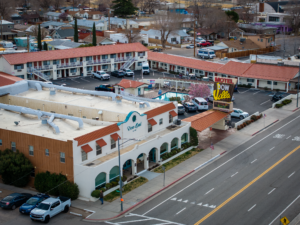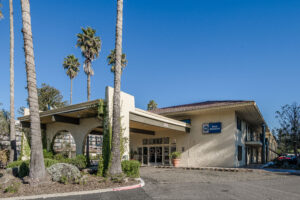How Hotels Can Gain an Edge This Year
How Hotels Can Gain an Edge This Year
GlobeSt.com
04/06/16
How Hotels Can Gain an Edge This Year
By Carrie Rossenfeld
http://www.globest.com/sites/carrierossenfeld/2016/04/06/how-hotels-can-gain-an-edge-this-year
SAN DIEGO—Being aware of trends in the capital markets, asset management, technology and customer service will serve hoteliers well this year, RAR Hospitality’s president Bob Rauch tells GlobeSt.com. His firm recently held a lodging forecast event here titled “Harnessing the Tailwinds: Capitalizing on the Successes of the Year Ahead.” We spoke exclusively with Rauch and Atlas Hospitality’s group president Alan Reay, who participated in the event, about some of the key takeaways that could help hoteliers gain an edge in a highly competitive industry.
GlobeSt.com: How can hotel investors and operators harness the tailwinds and capitalize on the successes of the year ahead?
Rauch: The first thing we talked about at the conference is that this is still a very, very strong year. While there may be headwinds in the future, right now everything is going smoothly. Whether it’s an impending terrorist attack, minimum-wage hikes affecting us in the future or Obamacare impacting our costs, these things have not hit us hard because RevPAR is moving at a faster clip than our increases in costs. We say take advantage of that. Don’t just take whatever business comes in—increase your rates. This party won’t go on forever. We have had tailwinds for the last 80 months, and no matter what happens in 2017, the party will come to an end. You don’t want to throw away profits, so think of where you can cut labor costs. Minimum wage is going up, and so are insurance and energy costs, so you’ve got to figure out a way to reduce those. If you shop aggressively, you can cut costs. I’m doing this now in anticipation of next year because it’s smart. there’s no reason to pay the going rate, so to speak. Also, if you haven’t renovated your hotel, now’s your last chance. You won’t have an excess of capital if we have a recession. Invest wisely in things that will make a difference for you.
Reay: Over the last two to three years, we have seen tremendous appreciation in RevPAR and net income at California hotels; however, a number of owners have not kept pace with the increases and are now trailing the market. For successful hotel operators, there is a lot of opportunity and upside in purchasing these underperforming assets.
GlobeSt.com: What should they be aware of with regard to the capital markets and asset management?
Reay: You need to make sure you underwrite the assets to take long-term interest rates into account; i.e. what do the returns look like if rates move up 1% to 2%? CMBS is shying away from the hotel assets, so make sure you have multiple lending sources you can rely on.
Rauch: Interest rates are rising, and it’s not about the Fed and what they do, but rather the interest rate a lender will give a hotel borrower today. Loans are tougher to get, and interest rates are in the range of 50% higher—they rose 60 bps in just a few months, and it’s because of the risks. Hotel lenders are looking at us getting toward the end of the cycle, so they’re raising interest rates. The loan-to-value is lower.
As far as asset management goes, it’s much more scientific today than it used to be. You used to deal with a building, depreciation schedules and capital investment, and this is till important, but you also need to look at whether the management team is prepared to act in today’s environment. The hotel chains make us use their antiquated revenue-management systems, and we have to go in and override the system we’re forced to use. When times are good, I have to find the best guess for my hotel: who will spend the most money there? We need to pick and choose our customers during good times, and during bad times we need to be careful about discounts tearing the property apart. These are sound operating principles for 2016. Most hoteliers are not tech savvy; they don’t know how to use technology, especially to create awareness of a property.
GlobeSt.com: How can hoteliers utilize technology and brand advocacy to gain an edge in a highly competitive sector?
Rauch: Brand advocacy requires that people are excited about your brand. We went to a provider that’s basically an app: Flip.to. What they do for us is send our guests an email that says if they want to tell their friends on social media anything about their upcoming vacation, we’ll help them. It’s a social-media toolkit; their friends know about their trip, and they’ve reached out to an audience of their friends, which increases reach. We try to capture the excitement for that guest. If we want brand advocates beyond our guests, we can reach out to people connected to our guest and make it easy for them to tout their great experience—and they’ll do that.
We beta tested an app we’re not going with because they couldn’t make it work economically. That app sent every guest a text message that said, “Open this for discounts to area attractions.” It gave them discounts on places to each, shop and play, as many as we could negotiate within five miles. And we would even drive them there for no charge. But the developer of the app couldn’t make it work well.
We recommend investing in technology. Also, make sure there’s a focal point in your hotel—a place or two where people can take pictures, with the name of the hotel in the background. When guests’ photos go viral, the name of the hotel goes viral, too.
GlobeSt.com: What else should our readers know about success in the hotel sector?
Rauch: The thing that is most important by a wide margin is people. I was at a Marriott conference, and Bill Marriott said the single most important thing in the hotel sector is people. If you hire the right people, they will take care of your guests and your guests will come back and spend more money with you. First and foremost is people. Second, you really have to be aware that the industry has finally changed from an art to a science. You can’t do it with just hospitality; you have to understand digital marketing and how distribution channels have changed for online travel agencies. They require 20% more commission. If all your business came from Expedia, for example, you pay them your profit margin and there’s no money left. You have to understand where business comes from and how to get new business. With revenue management, you need to find better guests: a high-end corporate group vs. a soccer team, for example. You have to use those tools. It’s much more sophisticated today than when I went to hotel school in the 1970s. third, “wow” customer service is the way to get lifetime guests. It keeps them coming back—they’ll be guests for life, and you’ll have the guests’ social-media contacts for life.
On the business side, if you can’t make a strong profit in 2016, you will never make a strong profit. You need to reevaluate who is managing your hotels.
Reay: It is important to understand that hotels are an operating business first and foremost and real estate second. If you do not have the right management in place, it does not matter how much of a great deal you have purchased; you will not be successful because hotels are very management intensive.


